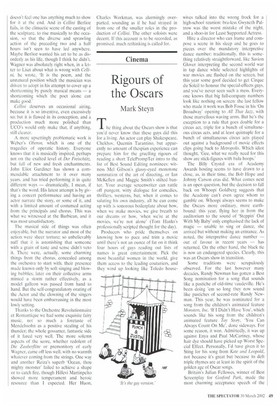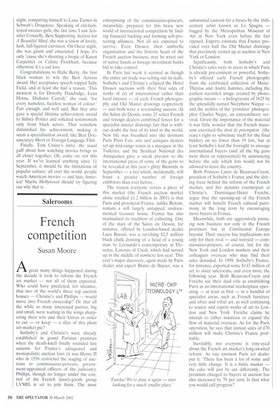Rigours of the Oscars
Mark Steyn
The thing about the Oscars show is that you'd never know that these guys did this for a living. An actor can play Shakespeare, Chekhov, Quentin Tarantino, but apparently no amount of thespian experience can prepare him for the gruelling rigours of reading a short TelePrompTer intro to the list of Best Sound Editing nominees: witness Mel Gibson's glassy-eyed monotone summation of the art of directing, or Ian McKellen and Maggie Smith's stilted banter. Your average screenwriter can rattle off pungent, witty dialogue for comedies, thrillers, westerns, but, when it comes to saluting his own industry, all he can come up with is sonorous boilerplate about how, when we make movies, we give breath to our dreams or how, when we're at the movies, we're not alone' (Tom Hanks's professionally scripted thought for the day).
Producers who pride themselves on knowing how to pace and trim a movie until there's not an ounce of fat on it think four hours of guys reading out lists of names is great entertainment. Pick the most beautiful women in the world, give them access to the leading couturiers, and they wind up looking like Toledo house wives talked into the wrong frock for a high-school reunion: bra-less Gwyneth Paltrow was the worst mistake of the night, and a shoo-in for Least Supported Actress.
Hire a director who can frame and compose a scene in his sleep and he goes to pieces over the mandatory interpretive dance number: traditionally, this is something relatively straightforward, like Savion Glover interpreting the second world war in tap dance while selected highlights of war movies are flashed on the screen, but this year some goof decided to get Cirque du Soleil to honour the special-effects guys, and you've never seen such a mess. Everyone knows that big full-company numbers look like nothing on screen: the last fellow who made it work was Bob Fosse in his On Broadway' opening to All That Jazz, with those marvellous waving arms. But he's the exception to a rule that goes double for a circus act, triple for a bunch of simultaneous circus acts, and at least quintuple for a bunch of simultaneous circus acts played out against a background of movie effects clips going back to Metropolis. Which idiot thought, 'Gee, what we really need for this show are stick-figures with hula hoops.'
The Billy Crystal era of Academy Awards hosting seems to have drawn to a close, as, in their time, the Bob Hope and Johnny Carson eras did. What comes next is an open question, but the decision to fall back on Whoopi Goldberg suggests that the Academy can't even agree whom to gamble on. Whoopi always seems to make the Oscars more ordinary, more earthbound: this year, flying her in from the auditorium to the sound of `Steppin' Out With My Baby' only emphasised the lack of magic — unable to sing or dance, she arrived but without making an entrance. As noted, the interpretive dance number — out of favour in recent years — has returned. On the other hand, the black tie is now an endangered species. Clearly, this was an Oscars show in transition.
Some traditions were scrupulously observed. For the last however many decades, Randy Newman has gotten a Best Song nomination for a song that sounds like a pastiche of old-time vaudeville. He's been doing 'ern so long they now sound like pastiches of second-rate Randy Newman. This year, he was nominated for a song from the children's animated feature Monsters, Inc, 'If I Didn't Have You', which sounds like his song from the children's animated feature Toy Story, You Can Always Count On Me', done sideways. For some reason, it won. Admittedly, it was up against Enya and Paul McCartney, whose hair dye should have picked up Worst Special Effect. Personally, I'd have given it to Sting for his song from Kate and Leopold, not because it's great but because its deft triple rhymes are at least in the spirit of the golden age of Oscar songs.
Britain's Julian Fe.Howes, winner of Best Screenplay for Gosford Park, made the most charming acceptance speech of the night, comparing himself to Lana Turner in Schwab's Drugstore. Speaking of old-fashioned sweater girls, the last time I saw Jennifer Connelly, Best Supporting Actress for A Beau tifid Mind, she was a vision of lovely, lush, full-figured curviness. On Oscar night, she was gaunt and emaciated. I hope it's only 'cause she's shooting a biopic of Karen Carpenter or Calista Flockhart, because otherwise it's a sad loss.
Congratulations to Halle Berry, the first black woman to win the Best Actress award. Her acceptance speech topped Sally Field, and at least she had a reason. 'This moment is for Dorothy Dandridge, Lena Home, Diahann Carroll,' she said, for every nameless, faceless woman of colour.' Fair enough, and well said. But they also gave a special lifetime achievement award to Sidney Poitier and solicited testimonials only from black actors. That somehow diminished his achievement, making it seem a specialisation award, like Best Documentary Short or Foreign Language Film.
Finally, Tom Cruise's intro: the usual guff about how watching movies brings us all closer together. Oh, come on, not this year. If we've learned anything since 11 September, it should be the limitations of popular culture: all over the world, people watch American movies — and hate America! Maybe Hollywood should try figuring out why that is.



































































 Previous page
Previous page